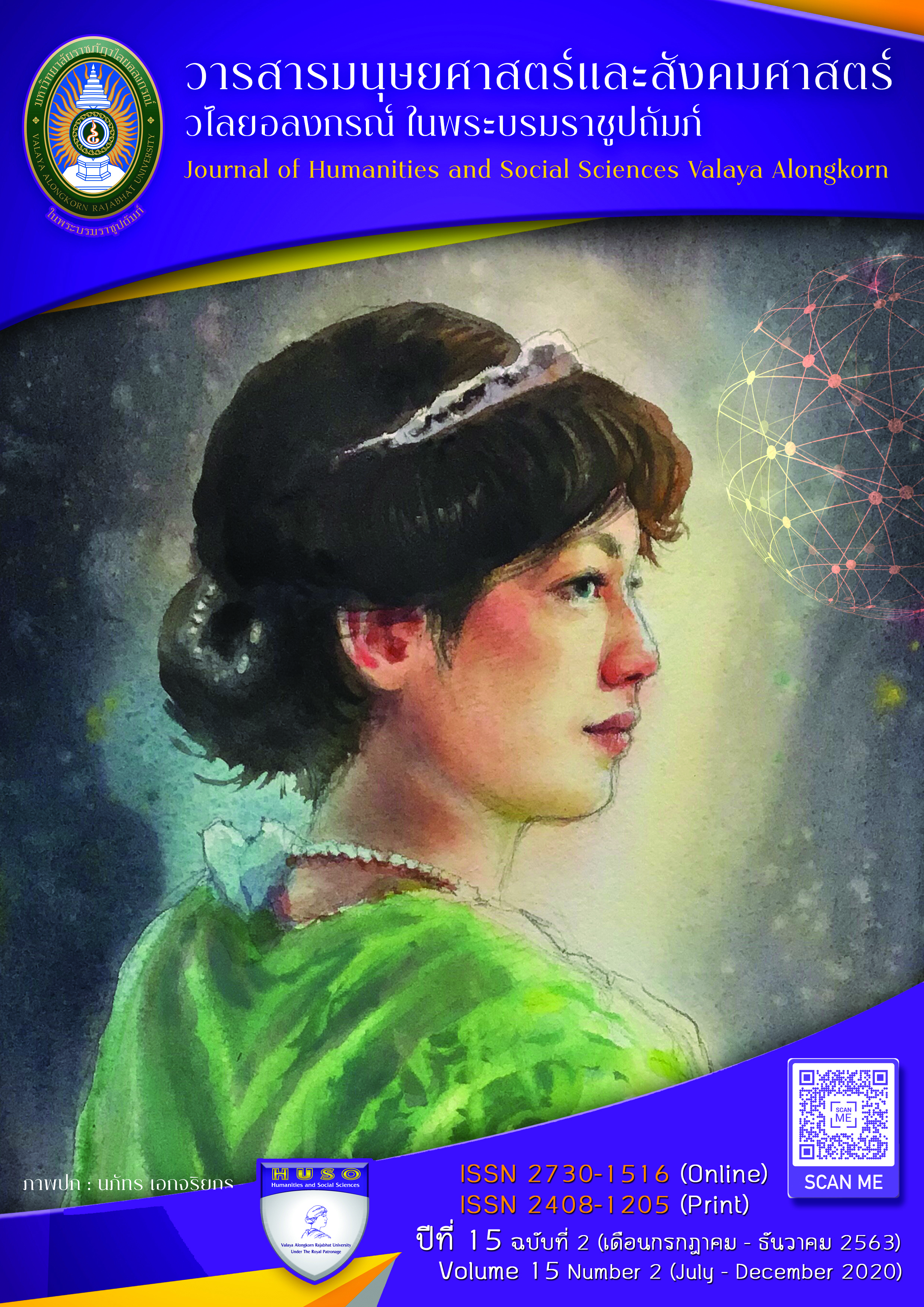RELATIONSHIP BETWEEN ADVERSITY QUOTIENT, EMOTIONAL INTELLIGENCE & JOB SATISFACTION IN NETWORK MARKETERS WITH GOAL COMMITMENT AS MEDIATOR FACTOR
Main Article Content
Abstract
The purposes of this research were to study Adversity Quotient, Emotional Intelligence, and Job Satisfaction with Goal Commitment as a mediator variable. Research tools consisted of questionnaire of Positive Adversity Quotient, Emotional Intelligence, Goal Commitment, and Job Satisfaction. Statistical data was analyzed by frequency, percentage, mean, standard deviation, Pearson’s correlation coefficient, Regression analysis, and the Sobel test.
The result found Adversity Quotient and its components were significantly correlated with Job Satisfaction. (r = .368, r = .183, r = .306, r = .143, and r = .378). Overall Emotional Intelligence and its components were positively and significantly correlated with Job Satisfaction. (r = .377, r = .317, r = .406, and r = .368). Goal Commitment was significantly correlated with Work Performance. (r = .434). Goal Commitment was found to be a partial mediator variable for the relationship between Adversity Quotient and Job Satisfaction. (Z = 3.806). And Goal Commitment was a partial mediator variable of Emotional Intelligence,
correlated with Job Satisfaction. (Z = 4.567).
Article Details
ลิขสิทธิ์บทความวิจัยที่ได้รับการตีพิมพ์เผยแพร่ในวารสารมนุษยศาสตร์และสังคมศาสตร์ วไลยอลงกรณ์ ในพระบรมราชูปถัมภ์ ถือเป็นกรรมสิทธิ์ของคณะมนุษยศาสตร์และสังคมศาสตร์ มหาวิทยาลัยราชภัฏวไลยอลงกรณ์ ในพระบรมราชูปถัมภ์ ห้ามนำข้อความทั้งหมดหรือบางส่วนไปพิมพ์ซ้ำ เว้นแต่จะได้รับอนุญาตจากมหาวิทยาลัยเป็นลายลักษณ์อักษร
ความรับผิดชอบ เนื้อหาต้นฉบับที่ปรากฏในวารสารมนุษยศาสตร์และสังคมศาสตร์ วไลยอลงกรณ์ ในพระบรมราชูปถัมภ์ เป็นความรับผิดชอบของผู้นิพนธ์บทความหรือผู้เขียนเอง ทั้งนี้ไม่รวมความผิดพลาดอันเกิดจากเทคนิคการพิมพ์
References
วรัญญพร ปานเสน. (2550). ความสามารถในการเผชิญและฟันฝ่าอุปสรรค ความผูกพันใจต่อเป้าหมายและวิธีการสร้างอิทธิพลที่ส่งผลต่อการปฏิบัติงานของนักธุรกิจอิสระในธุรกิจขายตรงหลายชั้น. มหาวิทยาลัยธรรมศาสตร์.
อัมพิกา สุนทรภักดี. (2559). การรับรู้การสนับสนุนจากองค์การ การรับรู้ความสามารถของตนเองด้านอาชีพ และผลการปฏิบัติงานของพนักงานขายในธุรกิจประเภทอาหารและเครื่องดื่มแห่งหนึ่ง โดยมีการยึดมั่นกับเป้าหมายเป็นตัวแปรสื่อ. การศึกษาตามหลักสูตรศิลปศาสตรมหาบัณฑิต. กรุงเทพ : มหาวิทยาลัยธรรมศาสตร์.
Bipp, T. and Kleingeld, A. (2011), "Goal‐setting in practice: The effects of personality and perceptions of the goal‐setting process on job satisfaction and goal commitment , Personnel Review, 40 (3), 306-323.
Brayfield, A. H., & Rothe, H. F. (1951). An index of job satisfaction. Journal of Applied Psychology, 35, 307–311.
Goleman, Daniel. (1998). Working with emotional intelligence. Bantam.
Hoppock, R. (1935). Job satisfaction. New York: Harper and Brothers.
Lee, H. J. (2018). How emotional intelligence relates to job satisfaction and burnout in public service jobs. International Review of Administrative Sciences, 84 (4), 729-745.
Lee, J. J., & Ok, C. (2012). Reducing burnout and enhancing job satisfaction: Critical role of hotel employees’ emotional intelligence and emotional labor. International Journal of
Hospitality Management, 31 (4), 1101-1112.
Locke, E. A., & Latham, G. P. (1990). A theory of Goal setting and Task Performance. Prentice- Hall, Inc.
Locke, E. A., Latham, G. P., & Erez, M. (1988). The determinants of goal commitment. Academy of Management Review, 1, 23–39.
Locke, E. A., Shaw, K. R, Saari, L. M., & Latham, G. P. (1981). Goal setting and task performance: 1968-1980. Psychological Bulletin, 90, 125-152.
Locke, L. A., & Latham, G. P. (2002). Building a practically useful theory of goal setting and task motivation. American Psychologist, 57 (9), 705-717.
Rakesh Kumar (2016). The Relationship of Personal Characteristics and Job Satisfaction to Adversity Quotient of Police Officers in Shimla District of Himachal Pradesh. International Journal of Economics and Management Sciences, 5 (3), 331-338.
Salovey P & Mayer. J.D. (1990). Emotional intelligence, Imagination, cognition and Personality. New York: Basic Books.
Shooshtarian, Z., Ameli, F., & Amini Lari, M. (2013). The effect of labor emotional intelligence on their job satisfaction, job performance and commitment. Iranian Journal of Management Studies, 6 (1), 27-43.
Sobel, M. E. (1982). Asymptotic intervals for indirect effects in structural equations models. In S. Leinhart (Ed.), Sociological methodology. San Francisco: Jossey-Bass.
Song, J. H., & Woo, H. Y. (2015). A study on AQ (Adversity Quotient), job satisfaction and turnover Intention according to work units of clinical nursing staffs in Korea. Indian Journal of Science and Technology, 8 (8), 74-78.
Stoltz, P.G. (1997). Adversity Quotient: Turning Obstacles into Opportunities. New York: Wiley & Sons, Inc.
Yamane, T. (1973). Statistics an Introductory Analysis. Tokyo: John Weatherhill, Inc.


